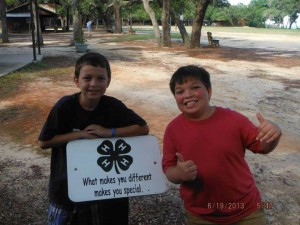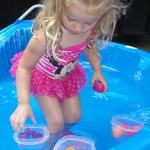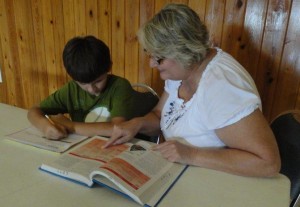by Monica Brinkley | May 13, 2015

With summer around the corner, it’s a great time to enroll your children in residential and/or day camps. For most communities there are a variety of camps offered. Camping experiences not only give children something to do, they are also great learning experiences.
Just as a garden or flowerbed requires critical elements like water, sunshine, space, and freedom from bugs to grow and to flourish, so do children. Similar to other living things, you need nourishing, supportive and protective environments where youth can grow to be healthy and contributing adults.
Each young person needs to:
Know they are cared about by others: Belonging
Feel and believe they are capable and successful: Mastery
Know they are able to influence people and events: Independence
Practice helping others: Generosity
Camps offer environments for growth, rich in the essential elements that support healthy development.
Very enthusiastic older youth and caring adults are the staff that lead the camps. Participating youth develop meaningful relationships with admired and trusted adults and older teens. New relationships begin as the campers share cabins and engage in camp activities. As a result of these experiences, the campers develop a sense of belonging as they realize that they are cared about by others.
During camp, youth develop many new skills. Camp teaches children to communicate, to work together as part of a team and to be a leader. Residential camps do this as the children learn to live in the same cabin and perform daily living chores. Leadership is developed by asking campers to fulfill responsibilities that may not be expected of them elsewhere. Additionally, sharing resources and attention helps foster teamwork and the desire to participate. Campers gain the sense of mastery as they become capable and successful at new skills.
There is a sense of adventure and challenge not usually found in daily home life. Most camps offer time for youth to test new ideas in a non-threatening environment. It pushes children out of their comfort zone and exposes them to new activities and experiences that they may not be familiar with. Many youth discover new hobbies or passions. By exploring various types of activities, children have a greater chance of finding something that they excel at or that makes them happy. Independence is gained as they are able to influence people and events.
Camp also provides many opportunities for youth to help fellow campers through daily chores of cleaning up cabins and dining hall, encouraging campers who may be homesick, cheering on their team, assisting camp staff, and so on. Our society needs for more people to gain the practice of helping others – that element of generosity.
Camp offers youth an opportunity to accept new responsibilities in leadership, conquer fears, practice new skills, and discover individual differences in an environment that reinforces the value of each person. These essential elements should be a focus of every camp. So as you seek camp opportunities for you children this summer, look for ones that feature these four essential elements. 4-H camping opportunities are available in every county in the state of Florida. Look them up and enroll your child today.

by Monica Brinkley | May 1, 2015
 With summer approaching, you might be asking, “What am I going to do with my children while they are out of school?” One solution is to get them involved in a club. 4-H is the youth organization of the Land Grant University System, of which the UF/ IFAS Extension Service is a part. 4-H and other clubs offer many benefits to youth who participate.
With summer approaching, you might be asking, “What am I going to do with my children while they are out of school?” One solution is to get them involved in a club. 4-H is the youth organization of the Land Grant University System, of which the UF/ IFAS Extension Service is a part. 4-H and other clubs offer many benefits to youth who participate.
For many children, they need to get out and do something. Research has pointed out many negative effects of spending too many hours in front of a television or on the computer. It is much healthier to be actively involved in activities, especially with other people.
I have said many times that idle time was detrimental to my children. Out of school time can be dangerous, as many children are exposed to drugs, alcohol, crime, and the list goes on. Clubs are a constructive way to spend their time.
Clubs offer a wonderful opportunity for children to meet new people and make new friends. Oftentimes, 4-H clubs are centered on a specific project or topic. Therefore, friendships or acquaintances are built around a common interest.
Life skill development is one of the greatest advantages of belonging to a 4-H club. Self-confidence grows as a result of obtained life skills. You can see from the chart below the four life skill areas and how the club leaders address the life skills through club involvement:
| 4-H Life Skill Area |
Targeted Life Skill(s) |
Suggested Activity |
| Head (thinking) |
Critical thinking, problem solving |
Use team-based activities with positive interdependence such as creating a group presentation on livestock disease |
| Head (managing) |
Goal setting, planning/organization, wise use of resources, keeping records, resiliency |
Assign individual roles such as leader, recorder, or materials manager to meet group goals |
| Heart (relating) |
Communications, cooperative, social skills, conflict resolution, accepting differences |
Provide youth with a means to assess group work skills and reflect on student performance independent from the other learning objectives |
| Heart (caring) |
Empathy, sharing, nurturing relationships |
Create long-term groups youth work within to share materials such as textbooks or tools |
| Hands (giving and working) |
Contribution to group, teamwork |
Successes and failures are shared by all members equally. Individual members can be randomly selected for assessment that will reflect on the knowledge/skills of the entire group. |
| Note: 4-H life skill areas and targeted life skills are from Norman and Jordan (2006), available at http://edis.ifas.ufl.edu/4h242. |
Many clubs have a great emphasis on teamwork. Members are encouraged to work toward a common goal. This can be done in a variety of ways including community service, group projects, or during camp, just to name a few. Youth develop independence as they gain these skills to carry throughout life.
Last, but not least, leadership and responsibility can be obtained with club involvement. Youth are allowed to make their own decisions, elect officers, and learn to lead, follow, and carry out their responsibilities.
What better way to learn these skills during their childhood in a safe environment than through club involvement in 4-H or other youth organizations? If your child is not involved in a club, use the summer to see what is offered in your community that will meet your family’s needs.
If you are interested in learning more about 4-H, go to florida4h.org.
by Monica Brinkley | Jun 2, 2014

Simple sorting games teach pre-math skills to young children.
Children are born curious and are constantly learning about the world around them. Children learn basic math skills through daily activities and interaction. They practice basic math skills as they notice differences between things, how events happen the same way every time, and how they can make events happen. Many parents push their children to count to ten, but teaching children to count involves more than reciting. It involves helping children understand the meaning of numbers.
Children will learn the meaning of numbers when they are developmentally ready. They might know the numbers in sequence, but are not able to use them to count. In others words, they may count to three and move four objects. Begin counting with children around the age of two to three. This helps children begin to move towards matching one thing at a time with the numbers as they say it.
Three- to four-year-old children are still learning to understand quantity. They usually can count to five and are growing in their understanding of what numbers really mean. By ages four to six, they are counting with meaning, usually matching the numbers one to ten with ten items.
Counting can be fun with your help. There are many fun activities you can do with your children to assist in learning the meaning of counting. Count socks as you sort them; count the juice boxes in the refrigerator or the cars going by. The more experience they are given, the more they will learn the meaning of numbers. Giving your child experience regularly will help them in their understanding of numbers.
To help your child get ready for math, give him/her opportunities to think about patterns and to sort things. Use items you find around the house or outside. Lay out a pattern with items such as a leaf, stick and stone and repeat the pattern. Ask your child to make the same pattern. This is a very simple but fun way to introduce math concepts. Sorting can be done easily when doing household chores. Sorting towels by color, putting small towels in this spot on the shelf and large towels in that spot are just a couple of sorting ideas.
Learning about shapes, space, and measurement are also pre-math skills you can help preschool children develop. Talk about shapes as you are walking or riding down the road. Examples: see the round stop light; this sandwich is square until we cut it in half, it then becomes a triangle. Inches, feet, and other units of measurement don’t make much sense to a young child. However, you can teach a child to measure with objects like a shoe. Have them see how long a rug is with a shoe. Then work up to giving them a ruler to work on measurement problems.
Teaching pre-math skills is easy. Recognize the curiosity in young children and use this as an opportunity to teach in a fun way.
Source: Penn State Extension; Better Kid Care, Math for Every Age.
by Monica Brinkley | Sep 24, 2013
Normal
0
false
false
false
EN-US
X-NONE
X-NONE
/* Style Definitions */
table.MsoNormalTable
{mso-style-name:”Table Normal”;
mso-tstyle-rowband-size:0;
mso-tstyle-colband-size:0;
mso-style-noshow:yes;
mso-style-priority:99;
mso-style-parent:””;
mso-padding-alt:0in 5.4pt 0in 5.4pt;
mso-para-margin:0in;
mso-para-margin-bottom:.0001pt;
mso-pagination:widow-orphan;
font-size:11.0pt;
font-family:”Calibri”,”sans-serif”;
mso-ascii-font-family:Calibri;
mso-ascii-theme-font:minor-latin;
mso-hansi-font-family:Calibri;
mso-hansi-theme-font:minor-latin;}
Some children dread the thought of doing homework. They may leave an assignment for the last minute or refuse to do it all together. Many parents handle this by trying to force their children to do their homework. However, getting into a power struggle with your child is not effective. By having clear rules and expectations, you can create a positive situation for both you and your child.

Help children develop good study habits
Meaningful homework can help students do better in school, especially as they get into the upper grades. Homework teaches children responsibility, as well as how to follow directions, manage time, begin and complete a task, work on their own, and practice what they’re learning in class. However, most children would much rather be playing or doing other things than homework. Many parents and children struggle over when, where, and how homework will be done.
At times, parents may feel that it would be easier just to do the work for their children. However, the National Parent and Teacher Association advises parents to let children do homework themselves. You may need to sit with elementary-school-age children and walk them through the process of how to study, help them organize the materials they need, and make sure they’ve completed all their tasks. As you do this, you are laying the foundation for good study habits.
Parents can offer to help check homework, but helping is very different from taking over. You also can reinforce good habits by helping your child find a regular place to work and a regular time of day to do homework. Instead of asking if your child has homework every night, always assume that there is homework, reading, or studying of some kind to be done.
Here are some tips on things you can do to help your children with homework:
- Have a set time for your child to do homework.
- Get the whole family involved by setting a regular family quiet time for working. Provide your child with a comfortable and well-lit place where they can do homework, such as a desk or a kitchen table with a chair. Minimize distractions by turning off the TV and making video games off-limits during quiet time.
- Make sure your child has pens, pencils, notebook paper, and any other supplies. Know where to direct your child to get information they may need, such as a school, a website, other children in the class, or a teacher’s help before or after school.
- Think of yourself as a coach to your children, providing assistance on what to do next if they get stuck, checking over their work when they are finished, or even helping them practice testing themselves on new skills. Showing interest in their work and encouraging their efforts can be a boost for your children and help them find greater success in school.
- Avoid constantly nagging or lecturing your child to do homework. If your child is continuously frustrated by or unable to complete assignments, visit your child’s teacher. Discuss ideas to work out possible strategies to help your child succeed.
For further information, go to EDIS.IFAS.UFL.EDU.
Sources: FAR1718 Helping Children with Homework, Heidi Liss Radunovich; FCS2203 Parenting During the Elementary School Years, Part 2: Discipline, Millie Ferrer-Chancy, Ingrid Rivera and Anne M. Fugate.
by Monica Brinkley | Apr 23, 2013
Se lf-control is an important skill for all children to learn. In other words, individuals know right from wrong or have power to control their own actions. Self-control is the ability to think before you act, rather than being controlled by your feelings. Children who rely on parents or other children to make choices for them do not learn self-control.
lf-control is an important skill for all children to learn. In other words, individuals know right from wrong or have power to control their own actions. Self-control is the ability to think before you act, rather than being controlled by your feelings. Children who rely on parents or other children to make choices for them do not learn self-control.
Often times, these children may follow others’ bad choices and not take responsibility for the consequences of their behavior. When the child is young, this causes many frustrations. As they grow, the problems can grow as well and the consequences can become more and more serious, even leading to self-destructive behavior like the use of drugs and alcohol. Therefore, it is very important to start young to build the skills that children will need later in life.
Self-control lessons start in the first year of life, but it is never too late to help a child build more self-control. Research shows that when you respond predictably to an infant who cries, later on that baby is likely to cry less rather than more. So you need to get to know your baby’s style of soothing.
Toddlerhood is a demanding time for parent and child. Many toddlers become frustrated because they may have trouble making themselves understood or may be too little to do the things they want to do. Expect toddlers to have little self-control.
Children behave best by keeping them on a regular schedule as much as possible. Help them get enough rest and serve regular meals and snacks. At this age, children are very distractible – you can redirect them to another activity when they are doing something unsafe. If your child has a temper tantrum, make sure they are safe and keep them from hurting themselves or others. After the tantrum is over, they need comfort and support. Teach some basic words, such as NO and STOP, to use in difficult situations. The goal of self-control at this age is to help children begin to use words to express themselves.
During the preschool years, children are eager to play with others their own age, but it is rarely smooth. The goal of this stage of development is to learn how to talk about a problem and solve it with words rather than aggressions. Encourage children to say what the problem is and ask them to come up with ideas for a solution. As long as all the children involved agree, let them try out their own solutions.
This is the time to introduce family chores. Simple jobs like setting the table and putting away laundry are good for children at this age. Research has found that children who have regular chores from the age of four are more successful in early adulthood.
The work of helping your child build self-control continues through the elementary school years and into the teen years. Children learn to be responsible by handling homework, family chores, and obligations to friends and family. Starting early and carrying on self-control lessons throughout your child’s developing years is the best way to give the gift of healthy self-control.






